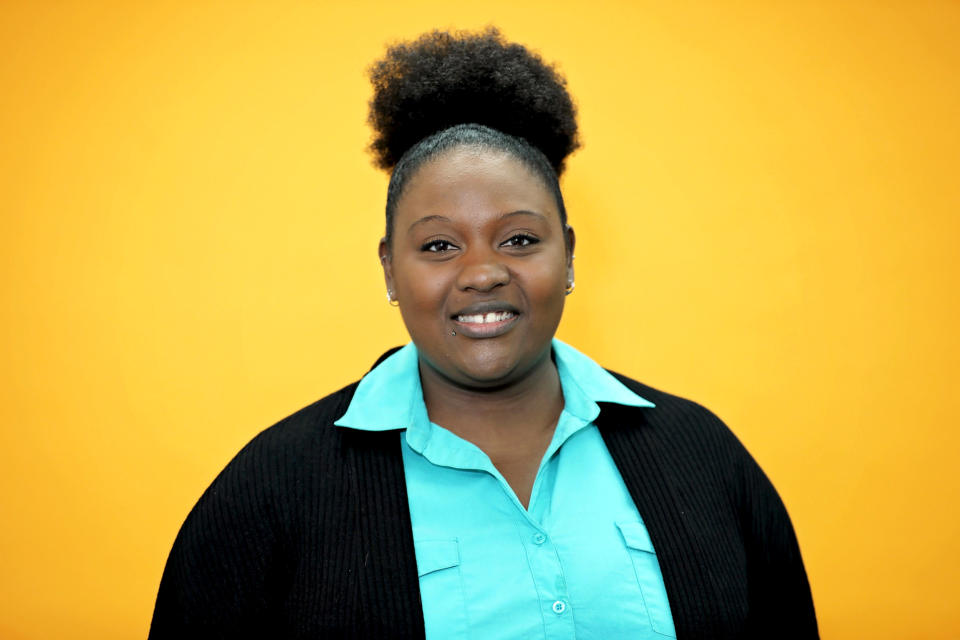Black LGBTQ youth, despite high levels of mental health issues, receive less professional care, study says
Black LGBTQ youth are less likely to receive mental health care than the general LGBTQ youth population despite reporting similar rates of depression and suicidal thoughts, according to a recent study.
The intersection of two identities -- LGBTQ and black -- makes these young people both more at risk of developing mental health problems and less likely to have access to adequate care, according to the study.
The finding, published in a brief released last week, is based on data from the inaugural National Survey on LGBTQ Youth Mental Health, conducted last year by the Trevor Project, an LGBTQ youth advocacy organization. It is the largest study on LGBTQ youth mental health ever conducted, with over 34,000 LGBTQ youth surveyed, and the results for black LGBTQ youth were compared with those of nonblack LGBTQ youth.

Myeshia Price-Feeney, a research scientist for the Trevor Project, said that while discrimination and bigotry can have serious negative effects on mental health, these experiences are exacerbated for black LGBTQ youth, who must also contend with r homophobia and potentially transphobia. But all too often, she added, counseling and other forms of mental health care are not sufficiently made available to black youth.
“Traditionally youth suicide has been really thought of as a white youth problem, or a Native American youth problem,” she said. “The attention has not been there for other youth of color.”
One of the study’s more troubling findings is that among those who have seriously considered suicide, only half of black LGBTQ youth reported seeing a counselor compared with 60 percent of nonblack LGBTQ youth. At the same time, the rate of suicide and suicide attempts has increased dramatically among black youth over the past few decades -- over 73 percent since 1991, according to one study.
Price-Feeney said that while the reason for this discrepancy isn’t known for sure, it is most likely due to a combination of factors that cause black youth to fall behind their nonblack peers: access to care, the relevant cultural competency of providers, and representation in the field.
She said that for people of marginalized identities, finding a counselor or therapist who understands their life experience -- or is at least trained to be sensitive to it -- is difficult, and that difficulty only increases when marginalized identities intersect. She said the data shows a need for more diversity in the field of psychotherapy.
“We all need to better understand the needs of black LGBTQ youth,” she said.
Price-Feeney added that mental health issues are not often seen as a problem for the black community, and that this could contribute to the stigma facing black youth who might otherwise be more proactive in seeking out care.
“If we see increased rates of homicide and the scenes in Chicago, we don't generally see discussions of mental health in that setting. We usually see an increased police presence and discussions of how we can prevent this violence,” she said. “I think that it does send the message that one group is more prone to these struggles, and the other group is not deserving of [mental health care]. And I think what ultimately can happen in those situations is that it can be internalized by people themselves.
Previous studies have shown that black LGB youth experience mental health issues at a higher rate than heterosexual black youth as well. An March 2019 study conducted by researchers at American University and published in the journal Culture, Health and Sexuality found that 56 percent of black LGB youth were at risk for depression, compared with 28 percent of their heterosexual peers.
That study was led by Ethan Mereish, the director of American University’s Lavendar Lab, which examines health disparities among marginalized populations. Mereish said he appreciated the Trevor Project study’s focus on black youth, whom he said the field of mental health research hasn’t paid enough attention to.
Mereish’s study found that experiences with racism and homophobia -- which, for young people, increasingly happen online -- increase the risk of negative mental health outcomes in black LGBTQ youth.
“Stigma, stereotypes and bullying specific to one's identity, those contribute to these differences in health outcomes,” Mereish said. “We need to address racism, heterosexism, transphobia, in schools and society, because these adolescents are exposed to it all the time.”
Mereish said the biggest problem is that many black adolescents and members of the LGBTQ community don’t have the financial resources to access affordable mental health care.
“Having financial resources or health insurance to be able to access a provider who someone can afford, that immediately is a barrier,” he said.
He added that for the black community in particular, there are reasons to be mistrustful of the professional mental health care industry.
“We have a history in our country of where medical institutions or research institutions have mistreated the black community,” Mereish said. “When you have a history of medical providers and institutions apparently being racist to you, it's hard to trust that now there is a safe space to have competent care.”
Price-Feeney said that while she hopes the Trevor Project study raises awareness of the issue, action is necessary to ensure that black LGBTQ youth are receiving the mental health care they need.
“We should start, as a society, addressing these things and directing funding to where we see this problem,” she said. “It's a serious issue, and we don't want it to get to the point where we're fixing it after the fact.”

